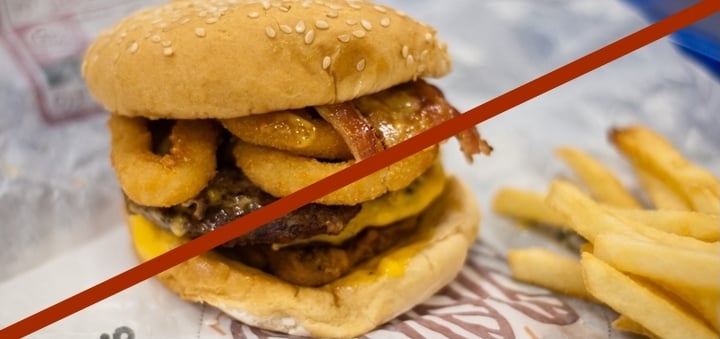
 Flickr (2011), CC BY 2.0[/caption]
Lent is upon us. In our household this means an extended period of fasting. My husband is a deacon in the Eastern Catholic Church (Melkite) and thus is required to fast for the entire season. That means that as his wife and support, I must too.
Fasting in the Eastern Church is rigorous -- no meat, no dairy; fish is limited to shellfish. If we were in our twenties with no health issues, this would still be difficult to follow. In our early sixties, we both observe diets that benefit our health. This diet eliminates most starch from our meals (pasta, beans, rice, and so on). Watching our cholesterol precludes eating shellfish regularly. There is not much left to eat, especially if you are not a good cook.
Flickr (2011), CC BY 2.0[/caption]
Lent is upon us. In our household this means an extended period of fasting. My husband is a deacon in the Eastern Catholic Church (Melkite) and thus is required to fast for the entire season. That means that as his wife and support, I must too.
Fasting in the Eastern Church is rigorous -- no meat, no dairy; fish is limited to shellfish. If we were in our twenties with no health issues, this would still be difficult to follow. In our early sixties, we both observe diets that benefit our health. This diet eliminates most starch from our meals (pasta, beans, rice, and so on). Watching our cholesterol precludes eating shellfish regularly. There is not much left to eat, especially if you are not a good cook.
 Flickr (2014), CC BY-NC-ND 2.0[/caption]
Even as I write this it sounds like a pathetic lament. But I confess that I find fasting very difficult. The reason is that after doing this for several years, it is still an empty obligation. I have yet to find the spiritual benefit from the fast.
I am well aware of the arguments. Bishop Kallistos Ware of the Orthodox faith has written a helpful pamphlet, "When You Fast," which I have read many times and annotated. He says never to treat fasting in a legalistic way, as an end in itself. At the same time, fasting reminds us that man is both body and spirit; St. Paul states that, "Your body is a temple of the Holy Spirit," (1 Corinthians 6:19) urging us to glorify God with our bodies. Bishop Kallistos writes of our willingness to fast in order to lose weight; "cannot we as Christians do as much for the sake of the heavenly Kingdom?" That pricked at my conscience as one who fasts year 'round to keep my weight in check. I admit that it's easier to do that because I get the instant gratification of stepping on the scale and seeing that I am successful. Lenten fasting lacks such reward.
I know that the purpose of fasting is not for payback. But I long for it to be something more than counting down the days until it is finished. It is painful to admit that the sameness of the meals and the added complications when it comes to shopping bother me a great deal. How I wish I had some inner understanding of why all of this is good and necessary for me to draw closer to God.
Intellectually I am aware of the arguments for fasting. Bishop Kallistos writes that, "The primary aim of fasting is to make us conscious of our dependence upon God." Our discomfort (hunger pangs, tiredness) reminds us of our "inward brokenness and contrition; to bring us ... to the point where we appreciate the full force of Christ's statement 'Without Me you can do nothing.' (John 15:5)"
Flickr (2014), CC BY-NC-ND 2.0[/caption]
Even as I write this it sounds like a pathetic lament. But I confess that I find fasting very difficult. The reason is that after doing this for several years, it is still an empty obligation. I have yet to find the spiritual benefit from the fast.
I am well aware of the arguments. Bishop Kallistos Ware of the Orthodox faith has written a helpful pamphlet, "When You Fast," which I have read many times and annotated. He says never to treat fasting in a legalistic way, as an end in itself. At the same time, fasting reminds us that man is both body and spirit; St. Paul states that, "Your body is a temple of the Holy Spirit," (1 Corinthians 6:19) urging us to glorify God with our bodies. Bishop Kallistos writes of our willingness to fast in order to lose weight; "cannot we as Christians do as much for the sake of the heavenly Kingdom?" That pricked at my conscience as one who fasts year 'round to keep my weight in check. I admit that it's easier to do that because I get the instant gratification of stepping on the scale and seeing that I am successful. Lenten fasting lacks such reward.
I know that the purpose of fasting is not for payback. But I long for it to be something more than counting down the days until it is finished. It is painful to admit that the sameness of the meals and the added complications when it comes to shopping bother me a great deal. How I wish I had some inner understanding of why all of this is good and necessary for me to draw closer to God.
Intellectually I am aware of the arguments for fasting. Bishop Kallistos writes that, "The primary aim of fasting is to make us conscious of our dependence upon God." Our discomfort (hunger pangs, tiredness) reminds us of our "inward brokenness and contrition; to bring us ... to the point where we appreciate the full force of Christ's statement 'Without Me you can do nothing.' (John 15:5)"
 Flickr (2008), CC BY-ND 2.0[/caption]
Fasting is supposed to lead to prayer but for me it is still an empty exercise. How can I make my knowledge of fasting penetrate my stone cold heart?
In one sense it is leading me to a simple prayer: "Lord, please show me how to fast such that it makes me more aware of You." Remembering from St. Paul that we are to pray always, this will be my consistent daily prayer.
I'd now like to ask: What does fasting mean to you? How do you make it work? What spiritual lessons have you learned from your fasting? Leave a comment and share with us the role of fasting in your spiritual life. I'd really like to know. Perhaps through our community I and others like me can figure out the mystery of fasting through our mutual sharing. In the meantime let us keep each other in prayer that we may fast in a more worthy manner.
I look forward to hearing from you.
Flickr (2008), CC BY-ND 2.0[/caption]
Fasting is supposed to lead to prayer but for me it is still an empty exercise. How can I make my knowledge of fasting penetrate my stone cold heart?
In one sense it is leading me to a simple prayer: "Lord, please show me how to fast such that it makes me more aware of You." Remembering from St. Paul that we are to pray always, this will be my consistent daily prayer.
I'd now like to ask: What does fasting mean to you? How do you make it work? What spiritual lessons have you learned from your fasting? Leave a comment and share with us the role of fasting in your spiritual life. I'd really like to know. Perhaps through our community I and others like me can figure out the mystery of fasting through our mutual sharing. In the meantime let us keep each other in prayer that we may fast in a more worthy manner.
I look forward to hearing from you.
What spiritual lessons have you learned from your fasting?
Copyright 2018 Susan Bailey
About the Author

Susan Bailey
Susan Bailey is the author of River of Grace: Creative Passages Through Difficult Times (Ave Maria Press), and Louisa May Alcott: Illuminated by The Message (ACTA Publications), part of their Literary Portals to Prayer series. Along with her blogs Be as One and Louisa May Alcott is My Passion, Susan writes for the Diocese of Worcester newspaper, The Catholic Free Press.


.png?width=1806&height=731&name=CatholicMom_hcfm_logo1_pos_871c_2728c%20(002).png)
Comments